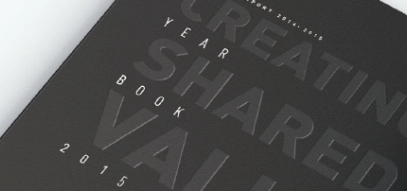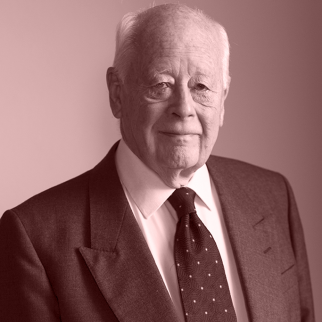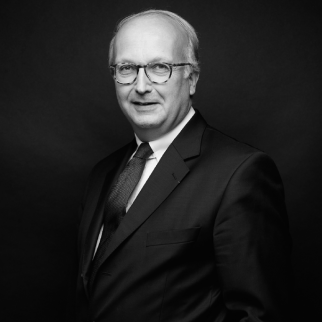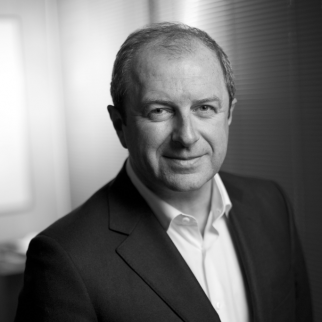Philippe Castagnac — Dear Charles, to start this interview, I’d like to ask you something: at the recent Global Drucker Forum, which Mazars supports loyally, you said ‘conversation builds trust’. Can I start our… conversation with that?
Charles Handy — The theme and, I suspect, the purpose of this Global Drucker Annual Conference was ‘claiming our humanity’. Like Peter Ducker used to do, we tried to think ahead what sort of Renaissance for obvious conflicts of interest. Due to the importance of added value in providing audit opinion for Public Interest Entities, as well as higher pressure on fees and the increase of regulatory restraints, the dilemma between being an auditor or an adviser has become even more acute. The digital leap would mean for us humans, how we could make it a progress; not just a technological breakthrough, not only in the world of management, but in society as well. For example, better communications and easier contacts facilitate conversations and you need a conversation to build trust; Steve Jobs is a famous example of someone who took his guests for a walk to talk. I’m the same kind of person.
|
| Way before publishing ‘The Second Curve’ in 2015, Charles Handy had aired the idea that people and organisations should prepare for the second part of their development journey before the first one begins to decline. |
Laurent Choain — Covering distances seems, by the way, a recurring theme in your work; in your last book, ‘The Second Curve’, you introduce this concept with a funny though insightful narrative, the road to ‘Davy’s Bar’…
C. Handy — The Wicklow Mountains lie just outside Dublin, Ireland. It is an area of wild beauty, and I return there as often as I can. Roads are unmarked, and I still get lost. Once I stopped and asked the way. ‘Sure, it’s easy,’ a local replied, ‘just keep going the way you are, straight ahead, and after a while you will cross a small bridge with Davy’s Bar on the far side. You can’t miss it!’. ‘OK, I’ve got that, straight on to Davy’s Bar’, I said. ‘That’s right. Well, half a mile before you get there, turn to your right up the hill.’ By the time I realised that the logic made no sense he had disappeared. As I made my way down to Davy’s Bar, wondering which of the roads to the right to take, I reflected that he had just given me a vivid example of paradox, perhaps even the paradox of our times: by the time you know where you ought to go, it’s too late to go there, or, more dramatically, if you keep on going the way you are, you will miss the road to the future. If you think the way to the future is a continuation of where you’ve come from, you may well end up in Davy’s Bar, with nothing left but a chance to drown your sorrows in a couple of beers and reminisce about the past. Listening to you, I think that Mazars went through a second curve when you became international and integrated against all odds twenty years ago. But the real question for you now is, when is the next inflexion, what is your next curve?
|
| Philippe Castagnac is Mazars’ Chairman and CEO. He leads the Group worldwide strategy by coordinating the GEB (Group Executive Board). |
P. Castagnac — I was amazed to see how quick you saw our context, our reality and some of the crucial choices we are facing. Though I will never ask for quick answers I am very eager to discuss with you how you see our next curve.
C. Handy — It seems that Mazars was very good at respecting a clever principle to address choices, what I call the distinction between closed and open problems. A closed problem is: ‘how do I go to Beijing’. But an open problem is: ‘why do I go to Beijing’? It takes agility and insight to think about open problems. If you want to address your next curve, you need to think of open problems, not closed questions with familiar answers, which eventually lead to a few beers at Davy’s Bar for the rest of your life.
L. Choain — In our industry, you choose between auditing clients and advising them, you simply can’t do both for obvious conflicts of interest. Due to the importance of added value in providing audit opinion for Public Interest Entities, as well as higher pressure on fees and the increase of regulatory restraints, the dilemma between being an auditor or an adviser has become even more acurate.
|
| As Mazars’ Chief People and Communications Officer, Laurent Choain focuses on globalizing talent management and innovating through cutting edge education initiatives. |
C. Handy — There are two different questions in there. Which would you need to be? And what will be interesting to do tomorrow? I can imagine that advising requires being creative enough not to be easily replaced by algorithms in the near future, which is a potential risk for audit procedures. Your question then is not only to wonder how to develop the advisory activity, but as well to question where you see the best concentration of knowledge and talent. This is where the second curve of an organisation can meet the second curve of individuals, so that both find new possibilities for themselves.
It takes agility and insight to think about open problems — Charles Handy Click to tweet!
P. Castagnac — More globally, society needs to evolve. Have we reached the point where a second curve must start for the Western world, or have we already reached Davy’s bar?
C. Handy — Clearly, we can already observe how institutions, and especially business institutions, have started to gradually dissolve. There will be fewer and fewer people needed in institutions; fleas – ie. tiny businesses or self-employed people – have started to replace elephants. Less than half of the people of a working age in Britain are working in an organisation with a full time contract. Or, if you prefer, 92% of the firms in Britain have less than five people. The opportunity for that is that you can be yourself. But the problem is that very few people know what they want to be or what they can be, and the education system is helpless in solving this new problem with old-established principles and structures.
L. Choain — Right, but younger generations are reinventing the way of doing business, probably not yet enough of doing politics, of exchanging ideas…
C. Handy — That’s true. But they have to choose what kind of life they want, and that’s a very difficult situation. Most of today’s young people were raised in the cult of success. But the society we have entered in is not multiplying wealth; it multiplies contacts, freedom, lifestyle, but not wealth. The 92% of British firms employing less than five people only generate 8% of the GDP. The ‘Airbnb’ model is cool but does not create much economic wealth. Productivity is going down, you can’t even measure it; what is the productivity of Airbnb? Of Uber? Companies and governments are going to be short of money, and austerity programmes will multiply.
Organisations can be a great playground for inventing the world of tomorrow — Charles Handy Click to tweet!
P. Castagnac — But then how do you see organisations coping with that kind of ‘impoverished’ economic situation? Are we bound to fade away?
C. Handy — Absolutely not. And you could be a great playground for inventing the world of tomorrow. Let me explain why; I was called two months ago by the head of recruitment of a very big firm in New York. They had a very successful recruitment campaign, recruited stars and offered them very generous employment terms. But most candidates eventually declined the offer. Long story short, I suggested that they should think of their new stars as guerilla fighters, not like disciplined soldiers of their army. Rethink yourself as a university. Take these people in for three to four years, teach them skills they don’t have yet, share some intellectual property with them, and after four years if they are good enough, push them outside to create their own operation, give them some start-up funding, take a seat on their board with 20% or so of equity, make them independent but connected to you, doing part of your business today but sending it back to you in other forms. This army of alumni will be the source of your creativity and your expansion.
P. Castagnac — How did the New York firm react?
C. Handy — Well, they said: ‘Thank you Charles, we’ll think about it’. But leaders often can’t do things that challengers will pioneer, and I have understood that this has always been your way of thinking, hasn’t it?




